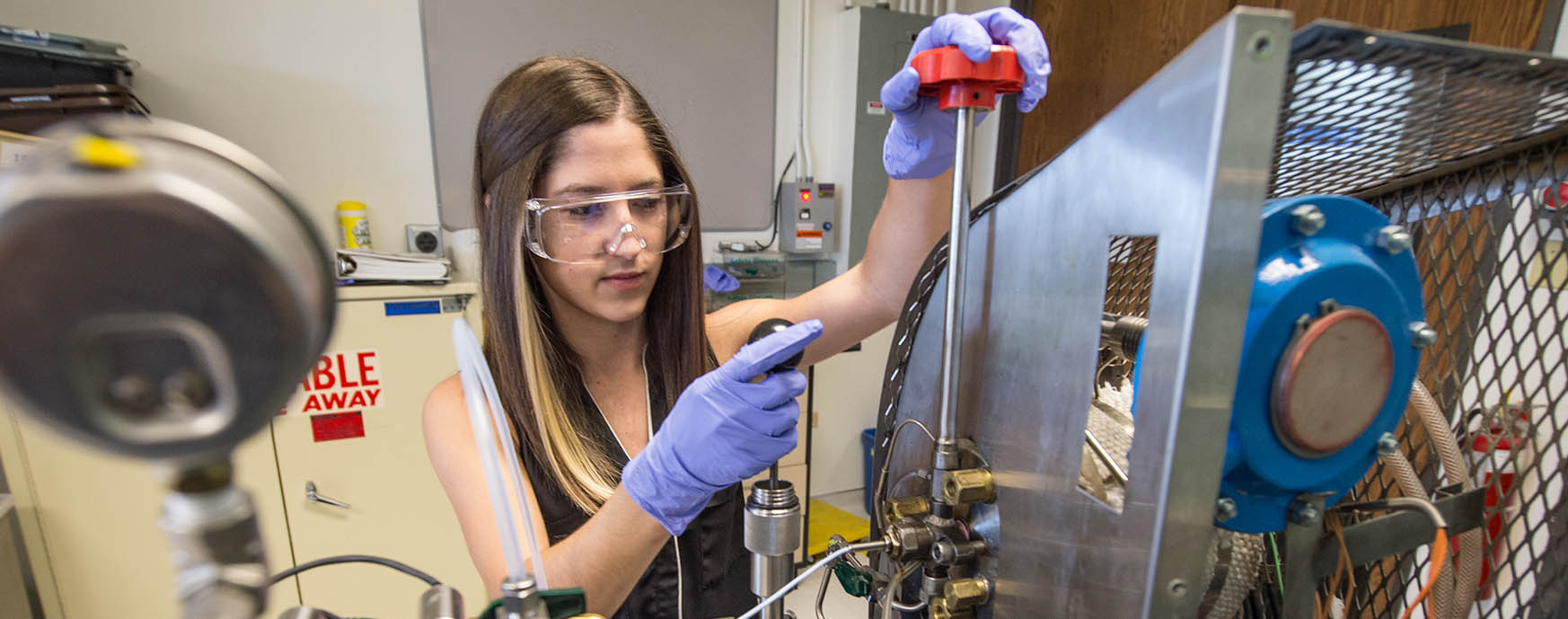Three-peat NREL Intern Pushes Boundaries of Early-Stage Fuels Research on Way to Master's Degree

Drew Cameron, Research Participant Program Intern, prepares a test for derived cetane number measurement in a constant volume combustion vessel in the Fuels Performance Lab. Photo by Dennis Schroeder, NREL 39396
One intern's path through three National Renewable Energy Laboratory (NREL) internships—culminating in her successful master's thesis—started somewhere unusual.
"I did undergrad at Seattle University and studied abroad at The Danish Institute for Study Abroad where we watched a video on energy research that mentioned NREL," Drew Cameron said. "I was so excited to discover an internship opportunity with a U.S. research institution dedicated to renewable energy."
Her interest sparked, Cameron discovered the Science Undergraduate Laboratory Internship (SULI) program that first brought her to work with the lab's Fuels and Combustion Science research team in 2014. The SULI program encourages undergraduate students to pursue science, technology, engineering, and mathematics (STEM) careers by providing research experiences at U.S. Department of Energy (DOE) laboratories. Full-time graduate and undergraduate students, along with recent Ph.D. graduates, can choose from more than 10 types of internships offered through the lab and DOE. DOE's Office of Science sponsored 95 SULI internships in 2017.
For Cameron's first SULI appointment, she joined the Fuels and Combustion Science team studying fuel ignition to make automotive engines more efficient and increase the use of renewable fuels. Her work on complex gasoline-surrogate fuels, using a constant volume combustion vessel (CVCC), helped develop faster, more efficient methods of characterizing the ignition chemistry of complex gasoline-range fuels at bench scale. This important new body of NREL research quickly caught industry's attention.
"The first summer she was here, Ford, GM, and Chrysler all expressed strong interest in our findings," said Cameron's mentor and NREL Advanced Combustion and Fuels Task Lead Brad Zigler. "She made meaningful contributions from day one, and we wholeheartedly supported her pursuit of a master's based on her initial SULI project."
Cameron's thesis work at the University of Colorado Boulder brought her back to NREL through the Research Participant Program to take a deeper dive into her initial project studying the kinetics and reactivity of complex gasoline surrogates. Like all NREL interns, Cameron had an assigned mentor, but she also worked closely with Research Scientist Jon Luecke.
"It was almost like I had two mentors," Cameron said. "Brad provided me with top-level direction on the project and helped me with professional development, and Jon taught me everything in the lab."
Back in the lab with Luecke, she was introduced to the Advanced Fuel Ignition Delay Analyzer (AFIDA), a device that is making its debut in the U.S. and provides greater flexibility than the CVCC for fuel ignition kinetics research.
"Being able to advance the research I started two years ago was really appealing to me," Cameron said. "It's really valuable that we found the limits of the CVCC, and we've been able to move beyond them. The research that we're doing is not typical for the AFIDA, it was made for diesel fuel, so to push its boundaries is exciting."
Cameron is testing the limits of the AFIDA by demonstrating its ability to characterize the ignition behavior of a simple, well-understood set of gasoline range fuels. Her identification of changes necessary to make the AFIDA compatible with different fuels is helping pave the way for more complex gasoline surrogate research.
In between her two stints with the Fuels and Combustion Science team, Cameron took on a second SULI assignment that brought her out of her comfort zone, diving into the chemistry of carbon nanotubes for thermoelectric devices. By consistently pursuing opportunities at NREL, Cameron was able to explore diverse areas of renewable energy research, help develop the capabilities of a new tool, and build relationships with top-level researchers. She is now en route to publishing her thesis, presenting her findings to automakers, and responding to industry inquiries about her post-graduation plans.
"I just love the research mission of the lab and the work environment, being surrounded by energy-conscious people," Cameron said. "Everyone's really passionate about their research and it's all something I believe in."
Last summer, NREL hosted almost 250 interns through a variety of mentored research internships and fellowships available for undergraduate students, graduate students, and faculty. Applications for summer 2018 SULI positions are due by January 12. Learn more about internships at NREL.
Last Updated May 28, 2025
